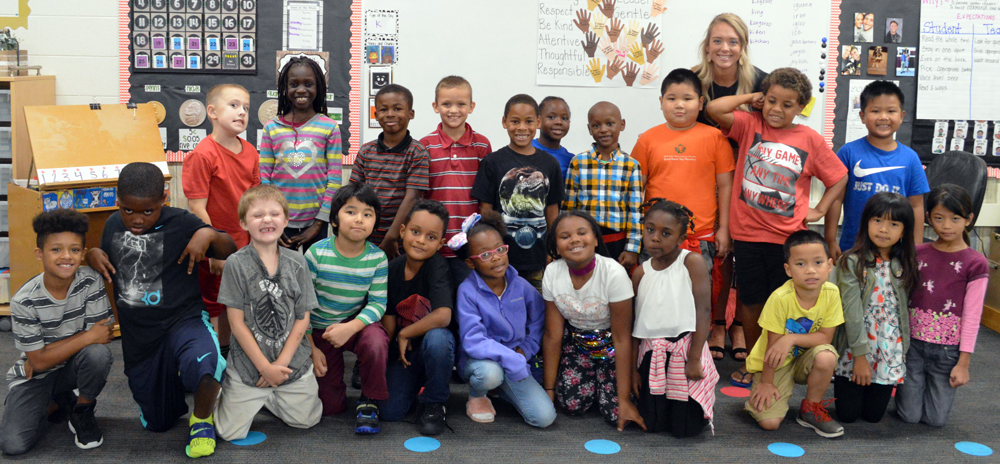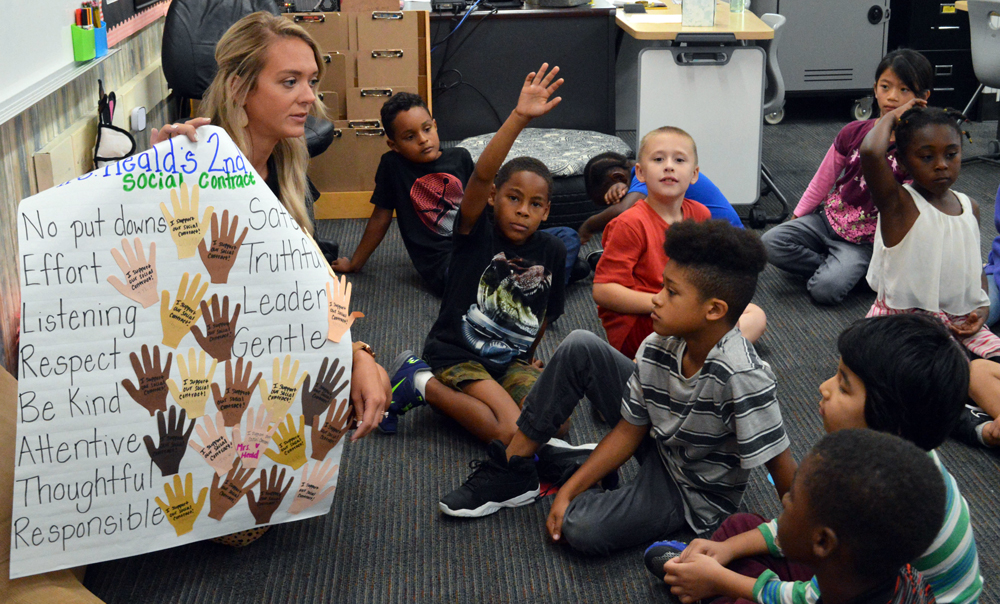East Kentwood High School vocal music teacher Carrie Hoeksema creates harmony in her classroom in more ways than one. For her students to learn best — and hit the right notes — she knows she needs to focus on more than just singing.
For more than a decade she’s used strategies to touch the hearts of her students in a genuine way, going above and beyond to make them feel like they belong on the risers, lifting their voices and being part of a classroom and school. She said the program she was trained in, Capturing Kids Hearts, has proven to be transformative. When students know she cares, they learn better.
“It’s more obvious to students that you care about them,” Hoeksema said of using the program. “The main component is the connectivity. You know how to reach kids faster, deeper and less surface-y.”
The program focuses on establishing a feeling of mutual respect between teachers and students; educators greet students as they walk in the door and everyone shares good news about their lives. Elementary students and teachers create a class social contract together.
Kentwood teachers have embraced the model, and now are taking efforts a step further with new phase of training. Capturing Kids Hearts 2 challenges them to reflect on their own strengths and weaknesses, and how to use that knowledge in a positive way.

Doubling-Down on the Program
In August, 800 staff members including teachers, bus drivers, counselors, custodians and other support staff members took part in Capturing Kids Hearts 2, a follow-up training that focuses on identifying personal behavior, strengths and behavior patterns in order to improve communication and focus on conflict resolution.
The training was funded through a grant from the Michigan Department of Education. Fifty new staff members received Capturing Kids Hearts 1 training and 25 are being trained as Process Champions, or leaders, in each building.
The district, which has a very diverse student body, is continuing its investment because of the impact it’s had, said Michael Pickard, director of elementary and federal programs. Full staff training began about 15 years ago and has become part of school culture.
Pickard said having a fully trained staff means everyone — regardless of their role at school — is on the same page in terms of communicating with students.
“In my opinion, Capturing Kids Hearts has changed the culture of how we do business. We are very kid-focused, very focused on all kids’ success, very focused on our staff working with kids and adults in a very positive manner,” Pickard said. “It is why Kentwood works from a team perspective.”
“Your classroom is your bus, is your building, is your lunchroom, your library,” he added, explaining how many staff members play a role in a student’s day. “We are training all of those people in Capturing Kids Hearts to make our team a better team.”

Strength? Constraint? Both?
Educators completed self-profiles on their strengths and constraints and then asked six others in their lives to assess them to evaluate if others perceive them as they perceive themselves.
“I don’t defer,” said Hoeksema, while teaching choir two weeks afer the training. “I’m a boss. I make all the decisions. I have low self-control.”
Her students laughed. “That doesn’t surprise anyone in this room,” she said with a smile.
Senior Lilliana Crowley was quick to interject. “I feel if you changed, you’d mess things up.”
Hoeksema said she knows her personality traits are both a strength and constraint, but she now has them in mind when she is interacting with students. She said she’s going to concentrate more on what students are saying and make sure she fully answers their questions. “I want to be more aware,” she said.
Hoeksema’s students said it’s pretty cool their teachers are examining their personalities as a way to improve. “I feel like they are there for everyone, just trying their best. This is another example of that,” said junior Raina Newman.
Lauren Heald, a second-grade teacher at Glenwood Elementary, was trained in Capturing Kids Hearts last year, and eagerly finished round two. ‘Overall, building those relationships was huge for me last year,” she said.
“I’m really getting to know my students on a deeper level.”
Heald said one of her constraints is self-reflection itself: “taking time to think about how my interaction may have gone with a student or co-worker.”
She has already had her class complete a social contract — a key part of Capturing Kids Hearts that involves student and teacher buy-in– to hang on the wall, with students adding strong, positive words about how to best get along.
They’re off to a good start.
Heald said there’s a lot that goes into the curriculum, but teaching is more than that, she said. Students need to feel safe and cared for.
“Our district is so unique. We are so diverse, so reaching every student from every different country, every different situation. This program has equipped me with the tools I need to better understand these children and build relationships with them.”
Accountability is Key
Vern Hazard is senior vice president of solutions at Texas-based The Flippen Group, the organization that created Capturing Kids Hearts. Hazard said its second part, Capturing Kids Hearts 2, helps push teachers further. “Each teacher has an unbelievable amount of strengths, but their constraints have a huge impact on where they go and don’t go,” he said.
The self-profile gives teachers a list of personal strengths and top three constraints in the areas of behavior, performance and relationships, along with a growth plan. When Hazard took it himself, his results showed he was highly nurturing, but didn’t hold people accountable. “I sugar-coated things and enabled rather than empowered,” he said.
That’s a problem, he knew. “Ignored behavior becomes accepted behavior; the lowest behavior accepted becomes your culture.”
But learning that about himself and changing his approach improved his teaching, coaching and parenting, he said.
Teachers receive ideas and suggestions to change outcomes. They also select an accountability partner, such as a fellow teacher, administrator, coach, who will give them honest feedback.












